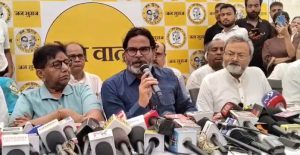Jan Suraaj alleges that a World Bank Loan of ₹14,000 crore was diverted to influence the Bihar election; the report examines claims, reactions, and political context.
Qalam Times News Network
Patna | 16 November 2025
World Bank Loan—this is the phrase Jan Suraaj leaders are leaning on as they accuse the Modi government of diverting ₹14,000 crore meant for development projects to win the Bihar election. According to them, this huge amount was allegedly used to fund cash transfers under the Mukhyamantri Mahila Rozgar Yojana just before voting.
The controversy deepened as Jan Suraaj repeated that the World Bank Loan meant for another project was misused to deposit ₹10,000 into the bank accounts of 1.25 crore women. They argue that this large-scale transfer directly influenced voting behavior and helped the NDA sweep the polls with 202 seats.
Jan Suraaj’s Allegation

Prashant Kishor’s Jan Suraaj Party has alleged that the Modi government diverted a ₹14,000-crore World Bank Loan to secure electoral advantage in Bihar. The party, which contested over 238 seats but failed to win any, raised this charge a day after the election results.

At a press conference, party president Uday Singh claimed that the NDA’s sweeping majority was “purchased,” not earned. He said nearly ₹40,000 crore was spent during the election period, part of which, he believes, came from international development funds. He noted that he had not yet received official documents, but said he had been informed that ₹14,000 crore from a World Bank-funded project was used for cash transfers.
What the Party Says Happened
Party spokesperson Pavan Varma added that Bihar’s public debt now stands at ₹4.06 lakh crore and the treasury is exhausted. He claimed that shortly before the Model Code of Conduct came into force, ₹14,000 crore was withdrawn and deposited into the bank accounts of 1.25 crore women under the Mukhyamantri Mahila Rozgar Yojana.
Varma admitted that their information “could be wrong,” but if proven true, he said it would raise serious ethical questions. Legally, governments can reallocate funds and provide explanations later, but morally, he argued, this would be indefensible.
Was the Scheme a Game Changer?
The Mukhyamantri Mahila Rozgar Yojana was launched via video conference by Prime Minister Narendra Modi on 26 September 2025. The scheme promises ₹10,000 as initial support to help women aged 18–60 start self-employment ventures, with the possibility of receiving up to ₹2 lakh later.
Just before the election, ₹10,000 each was transferred to 1.25 crore women—amounting to roughly ₹12,500 crore. Jan Suraaj says this money came from development funds, specifically the World Bank Loan, and became the biggest factor in the NDA’s strong performance. They also pointed out the irony of the Prime Minister criticising ‘freebies’ elsewhere.
Why Did Jan Suraaj Lose?
Rejecting the idea that its stance on ending prohibition hurt its chances, the party argued that liquor is still widely available in Bihar despite the ban, often at high black-market prices. Varma said lakhs of marginalised people remain in jail over liquor cases, many unable to afford bail.
He argued that the women-focused cash transfer—and not prohibition politics—decided the election. “What helped the NDA was what Nitish Kumar offered to women and the last-minute transfer of ten thousand rupees,” he said.
The Electoral Blow
Jan Suraaj suffered a complete wipe-out, winning zero seats despite contesting more than 238. Meanwhile, the NDA won 202 seats in the 243-member assembly—its second time crossing the 200-seat mark, repeating its 2010 feat. The Mahagathbandhan managed just 35 seats.







